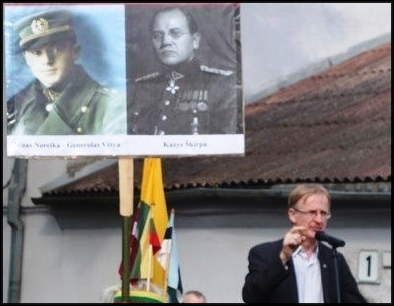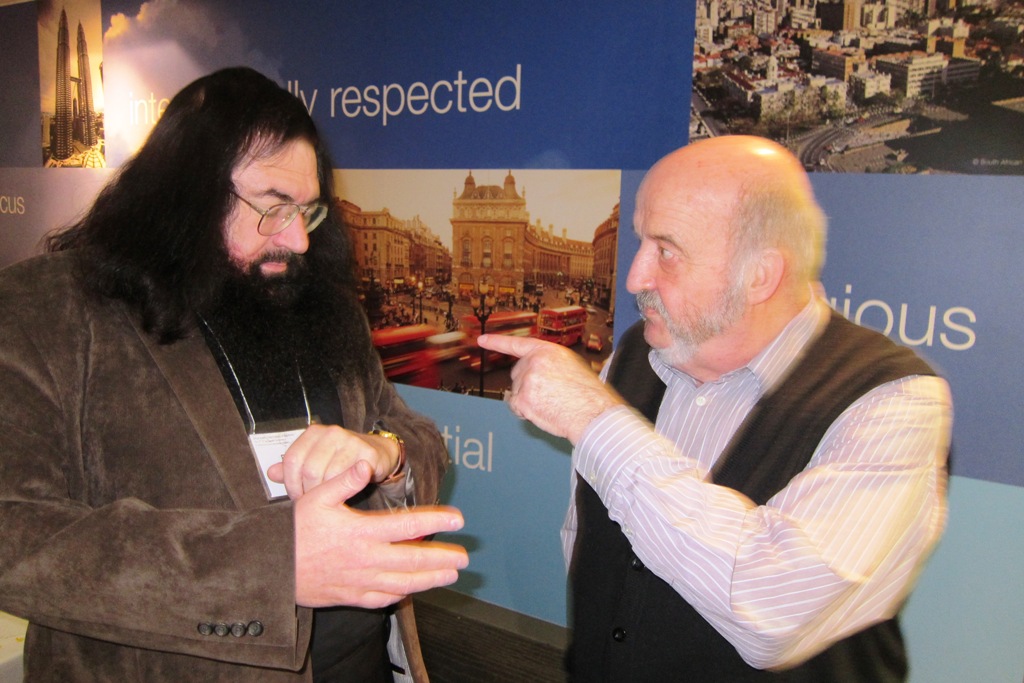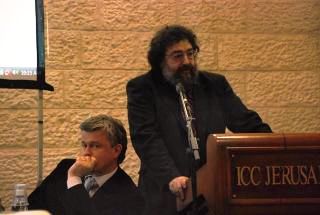[most recent update]
Israeli Foreign Policy and the Holocaust in Eastern Europe (1990 — 2023)
JUMP TO LATEST
JUMP TO LATEST
22 April 2006. Article in Respublika accuses Dr. Yitzhak Arad, Holocaust survivor, resistance hero, veteran of the Israeli war of independence and long-time director of Yad Vashem, of being a war criminal on the basis of misquoted, decontextualized passages in his own 1979 book, The Partisan. [ADDENDUM of April 2014: One of the chief stone-throwers (final section) is A. Anušauskas, who is today a member of the state’s commission on Nazi and Soviet crimes. In 2006 he was “scientific editor” at the Genocide Center. Since 2008 he has been a member of parliament where he was for some years chair of the Committee on National Security and Defense.]
♦
10 September 2007. Prosecutors in Lithuania confirm that their investigation of Holocaust survivor, anti-Nazi resistance hero and former director of Yad Vashem Dr. Yitzhak Arad, on suspicion of “crimes against humanity” had been initiated in May 2006. The “investigation” was based on an article in the antisemitic daily Respublika (22 April 2006), in which the special prosecutor and head of the Genocide Center are extensively quoted. In June 2006 the daily triumphantly proclaimed that prosecutors were acting on its earlier article. English summary. See below at 25 September 2008 for “conclusion” of the investigation and the 2010 report of the “Lithuanian Human Rights Association” . . . In 2014, ongoing defamation evident from Wikipedia entry.
♦
29 January 2008. Article in the daily Lietuvos aidas that called on prosecutors to investigate Fania Yocheles Brantsovsky and Dr Rachel Margolis. English translation.
6 April 2008. Professor Dov Levin of Jerusalem protests, returning his own earlier award to the president of Lithuania.
30 April 2008. The Embassy of the United States in Lithuania issues a certificate of appreciation, signed by Ambassador John A. Cloud, to Fania Yocheles Brantsovsky; presented by political officer Joseph Boski at a luncheon organized by the Vilnius Yiddish Institute.
Yitzhak Arad (originally Rudnitzky), a native of Svintsyán (Švenčionys, Lithuania, some 90 km north of Vilnius) passed away peacefully in Tel Aviv on Thursday. He was laid to rest Friday at Kibbutz Einat near Tel Aviv. His dramatic career included fighting the Nazis as a bold partisan in the forests of Lithuania, fighting with equal heroism in the air and ground forces that won Israel’s war of independence, rising to brigadier general, becoming a major Holocaust scholar and author, serving as director general of Yad Vashem for two decades (1972-1993), and, in the twenty-first century, becoming the first of a series of Holocaust survivors who joined the anti-Nazi resistance to be publicly accused by Lithuanian prosecutors of “war crimes” (with not a shred of evidence) as part of a massive campaign of Holocaust revisionism and inversion emanating from the state and its lavishly sponsored “genocide center” and “red-brown” commission as well and numerous elite operatives in the media, academia and literature.
The Holocaust revisionist who started the campaign against Arad in 2006 (in an infamous interview in the antisemitic Respublika representing the state’s “Genocide Center“) is today the nation’s Minister of Defense (!). It was, it turned out, the opening salvo in a years’ long saga that came to include Dr. Rachel Margolis (1921-2015), Ms. Fania Brantsovsky (1922- ), and other heroes of the anti-Nazi resistance regarded as “war criminals” by the far-right revisionist history units financed by East European states and their centers, professors, press maestros and operatives on an industrial scale.
Arad was the first Jewish partisan veteran to be libeled (in 2006) by kangaroo prosecutions of Lithuania’s “history fixing” units in the effort to revise Holocaust history. One major component of the multilayered effort, epitomized by Lithuania’s state-sponsored “Red-Brown Commission” and its Genocide Research Center, has entailed painting Holocaust victims who survived by joining the resistance as perpetrators and perpetrators (particularly of the atrocities of 1941) as victims. Follow the ins-and-outs in Defending History.

VILNIUS—Shortly after Defending History published the news yesterday that Dr. Arūnas Bubnys, longtime chief historian at Lithuania’s state sponsored far-right Genocide Center had been nominated by the speaker of parliament as the center’s new director, news published also by New York’s Algemeiner Journal, a social media campaign began to try to spread a rumor that the DH photo of Dr. Bubnys proudly speaking less than a year ago under banner images of Holocaust collaborators Jonas Noreika and Kazys Škirpa was “photoshopped.” Two of DH’s Vilnius-based team, Julius Norwilla and Dovid Katz, monitored the event from start to finish. Their report appeared the same day, 23 June 2020, the 79th anniversary of the outbreak of the Lithuanian Holocaust. Instead of honoring the victims — defenseless Jewish citizens, often older rabbis and younger women brutalized and murdered by the “White Armbander” fascists — the event, like many legitimized by Lithuanian government institutions, glorified the killers, who are invariably described as “heroic anti-Soviet rebels.” This is of course a patent historic nonsense. The USSR’s forces were fleeing Hitler’s invasion, Operation Barbarossa, the largest invasion in human history, not the local white-armbanded Jew-killers. While the Soviets were in power, the Hitler-backers and murderers of civilian neighbors now adulated as “anti-Soviet rebels” did not fire a single shot. Not even at a local rabbit.
See DH’s sections on Dr. Bubnys, the Genocide Center, and commemorations of 23 June 1941, as well as reviews of his books on the Vilna Ghetto and on the Kovno (Kaunas) Ghetto.
UPDATES
22 APRIL: BUBNYS NOMINATION CONFIRMED BY SEIMAS
Secret ballot: 76 for, 34 against,8 abstentions, 2 spoiled ballots
Update of 21 April 2021: “No, Sir. This is No Photoshop”
Algemeiner Journal reports of 15 April and of 22 April
Background:
SEE DH SECTION ON DR. BUBNYS AND STATE HOLOCAUST REVISIONISM IN LITHUANIA
EYEWITNESS REPORT: DR. BYBNYS’S PUBLIC 2020 ADULATION OF COLLABORATORS
SECTION ON THE GENOCIDE CENTER
◊
◊
The decision announced by leaders of the three major universities in Lithuania, and of its History Institute, to belatedly break off ties with the antisemitic, ultranationalist, far-right, history-revisionist “Genocide Center,” a state-sponsored institution, is both “better than nothing” and “better late than never.” For over a dozen years now, Defending History has documented the Center’s role in spewing antisemitism, while underpinning ultraright Nazi-sympathetic nationalism and Holocaust obfuscation and denial wrapped up in pseudo-historical research; a similar record has been kept of its obedient showcase of fake history to the outside world, the “Genocide Museum”). The shocking wall of skittish silence on the part of professors, diplomats, and political leaders has been apparent not only within Lithuania, but also from some Holocaust, history and international (particularly American-based) Jewish organizations whose leaders covet the local medals, honors, photo-ops and junkets that give them that certain godlike ego-boost that is only to be had, it seems, east of the former Iron Curtain.
◊
◊
NOTE: The original (2009) version of this document was constructed in close cooperation with the late Dr. Shimon Alperovich (1928-2014), elected head of the Jewish Community of Lithuania for many years. Revisions were discussed with him in detail until several days before his death in 2014. Naturally, he does not bear responsibility for the document’s annual updates since that time but his intellectual imprint on its spirit should not go uncredited.
Abandonment of the state’s financing of the campaign to obfuscate the Holocaust by means of its Double Genocide campaign, including “cooked” international events, conferences, film screenings and panel discussions; withdrawal of formal state support for the Prague Declaration and similar projects, closing down of the “red-brown commission” and the inauguration of an atmosphere of full freedom for citizens and organizations to support alternatives including the Seventy Years Declaration. Holocaust history to be included in historically accurate proportionality in the Genocide Museum and all relevant tourist locations that deal with genocide. Abandonment of the extensive state sponsored program to glorify the local Holocaust perpetrators of 1941, including the “Lithuanian Activist Front” (LAF), whose leaflets indicated desire to murder the country’s Jewish citizens even before arrival of Nazi forces. Rapid correction of the mischaracterization of the early local perpetrators as supposedly heroic rebels in the new basement room on the Holocaust in the Genocide Museum.
◊
C O N T E N T S:
Introduction
Lithuanian Nationalism and Antisemitism Prior to the Holocaust
The First Soviet Occupation of Lithuania, 15 June 1940 – 22 June 1941
The Lithuanian Activist Front: Antisemitic Incitement
The German Invasion and the Organization of an “Independent” Lithuanian Government
The Period of Pogroms: Late June to Mid July 1941
The Lithuanian Press at the Time of the Pogroms: A Source of Incitement
The Lithuanian Provisional Government: Anti-Jewish Legislation
Systematic Mass Murder: German Design and Command, Lithuanian Perpetration (late July–November 1941)
Lithuanian Police Battalions and Their Role in the Murder of the Jews
The Lithuanian Catholic Church and the Holocaust
The Rewriting of Holocaust History and the Double Genocide Thesis — “The Jewish Holocaust and the Lithuanian Holocaust”
Anti-Soviet Guerilla Warfare in Lithuania
The Prague Declaration of June 2008 and the European Parliament Resolution of April 2009
Conclusion
Notes
In Lithuania, as in other places in Europe conquered by Nazi Germany, a thorough and comprehensive inquiry into the tragic events that occurred compels consideration of three factors:
The Holocaust Obfuscation movement suffered a severe blow today with the public resignation from the Lithuanian government’s red-brown commission of Professor Konrad Kwiet, a major international scholar of the Lithuanian Holocaust. The resignation had been announced verbally at the recent ‘Aftermath’ conference held in Melbourne at the Australian Centre for the Study of Jewish Civilisation.

Professor Konrad Kwiet (right) makes a point to Dovid Katz at the June 2011 Aftermath conference at Monash University in Melbourne. Photo: Ariella Leski.
O P I N I O N
On February 6 and 7 of 2011, there will be a conference held in London, entitled “No simple stories: Jewish-Lithuanian relations between coexistence and violence”. Taking into account that some 95% of Lithuanian Jews were killed during the Holocaust — the highest percentage in all of Europe — this is quite a heartbreaking title, isn’t it?
“No simple stories” — really? For those Lithuanians involved, killing Jews was quite simple, even before the Germans arrived.
“No simple stories.”
Really?
There has been a two-pronged assault today in the mainstream mass media in Lithuania on the tiny but vibrant Jewish Community of Lithuania. The community has been busy in recent days with concluding Chanukah festivities and moving on one day later to a photography contest for young people. The judges include some of the top Lithuanian art photographers, and the event, popular on Facebook, features Jewish and Lithuanian photography lovers enjoying themselves together in harmony.
The Seimas (parliament of Lithuania) today issued this official English version of its ‘resolution on declaring the year 2011 as the year of remembrance for the victims of the Holocaust in Lithuania’. The succinct statement expresses ‘sincere respect for the victims of the Holocaust in Lithuania’, mentioning ‘the genocide perpetrated against Jews by Nazis and their collaborators in Lithuania during the occupation by Nazi Germany’.
It goes on, in Article 2, to propose that by 1 November 2010 there be a specific program approved, that will include Continue reading
After authoring the book on Litvak culture for the Lithuanian section at the February 2009 Jerusalem Book Fair, the editor of this website who is the founding professor of Yiddish at the Vilnius Yiddish Institute, declined to attend to chair the Yiddish culture session, when he was told not to bring to the fair Dr. Rachel Margolis, resident in Rechovot. Dr. Margolis is one of the heroic Jewish partisans defamed by the Double Genocide industry.

Is the master J-handler keeping an eye? Prof. Sarunas Liekis (left) and Prof. Dov-Ber Kerler at the Jerusalem Book Fair.
The Lithuanian government unit running these affairs rapidly replaced him with Dov-Ber Kerler, the Alice Field Cohen professor at the Borns Jewish Studies program at Indiana University (Bloomington), who did not have time to keep a promise to visit with Dr. Rachel Margolis in Rechovot, as a symbol of moral support for the accused Holocaust Survivors. The complete program of events paid for by the Lithuanian government is here (but note that contrary to the published-for-PR schedule, Yitzhak Arad did not — as a matter of principle — appear at the event).
Sir Martin Gilbert has today authorized publication of his 24 August 2008 letter to this journal’s (future) editor. The facsimile follows. The letter had confirmed his April 2008 resignation from the “International Commission for the Evaluation of the Crimes of the Nazi and Soviet Occupation Regimes in Lithuania” (known informally and for brevity as the “Red-Brown Commission”), citing the Yitzhak Arad affair.
In view of the subsequent developments, the 24 August letter also cites the need for the Commission to condemn the defamation of additional Holocaust survivors Fania Yocheles Brantsovsky, Professor Sara Ginaite, and Dr. Rachel Margolis. Professor Gilbert’s authorization for publication came after the Commission’s website failed to remove his name from the list of members in spite of his resignation on principle.